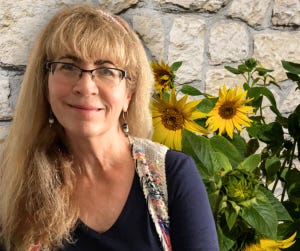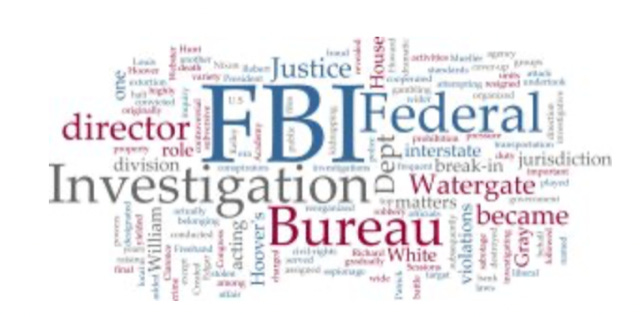Meet L.L. Kaplan, author, former FBI special agent & prosecutor
Lisa shares about her cozy criminal procedurals, popular myths about the FBI and the legal process, and the thawing time for a body
Please give a warm welcome to author L.L. Kaplan! Lisa is a former prosecutor and FBI Special Agent who now writes crime fiction. Her crime fiction Full Circle series is out on submission with her agent. (Wish her good luck!)
Her official bio: Lisa is a former prosecutor who spent twenty years as an FBI Special Agent. While at the FBI, she worked everything from fraud to espionage, but alas, no X-files. Lisa retired and now pens crime fiction where justice prevails, but doesn’t always end in handcuffs. She’s the author of two mystery series as well as a children’s book based on a true story. All are set in Northern Ohio. When not plotting mischief or jogging with friends, Lisa can be found at Tails of Vermilion her pet store for cats and dogs, where the employees volunteer and all profits fund animal causes. She lives in Northern Ohio with her husband and one very spoiled rescue cat named Bandit.
Tell us a little about your work and yourself. You have an agent and now you have a series out on submission, correct?
I do have two mystery series out on submission (and a third in the works). All three have female protagonists and are set primarily in Northern Ohio. The first series, as highlighted on my website, is “Full Circle” and the heroine is ADA Casey McKittrick. The second series features a retired, slightly disgruntled FBI Agent turned non-profit bakery owner. Yeah, that second one is definitely NOT autobiographical in the least. LOL 😉 My series are all set in the same fictional world and timeframe so they can potentially run into each other. It makes it fun!
Are you like your protagonist ADA Casey McKittrick? You've both worked in law, so I know you have that in common.
Well, we both went to Georgetown for Law School and did stints as prosecutors, but that’s about it career-wise. I would say I share her outlook and values, but I think I made her braver, more intuitive, and less dopey than I really am. She’s definitely a better runner too! I think we writers infuse our characters, both consciously and unconsciously, with attributes that we have as well as aspirational ones too. For me, I purposefully try and divide my faults and less admirable traits amongst my characters. It would just be too unfair to saddle one with everything. LOL
What kind of research did you do for your Full Circle series?
Since it is a contemporary series (not set in ancient Egypt or Victorian England say) in a place I know fairly well, my research was more directed to specific issues, processes, items, or events. I didn’t have to create an entirely new world thank goodness. But my research touched on many areas both historical and present day. Everything from the presence of criminal groups/activity in Ohio to the advent of personal monitoring techwear to retirement care homes to human trafficking and even thawing times for a human body (yes, really) as well as other forensic topics.
So what IS the thawing time for a body?!
Oh, easy answer. It depends!!!! Really! That’s what I found out. It isn’t one answer fits all. There are many factors even beyond temperature, body size and type of freezing element (eg. freezer versus freezing lake). I found formulas for estimations, but wasn’t sure about their accuracy. I did note that the purpose for thawing a human body is relevant. For example, if an ME needs to perform an autopsy and the body is actually frozen, it needs to be thawed slowly or decomposition may start and do ugly things before the autopsy can be done. That could be a week or more. Now on the other end, how long does it take a dead body to freeze? Same. It depends on many of the same factors as thawing like the body weight, freezing element, etc. From my brief exploration of the area, it seemed it could be anywhere from 5- 24 hours (or more-don’t quote me 😉 ). While I didn’t get the definitive answer I wanted, at least I had enough wiggle room for writing. And yes, like all mystery authors, my browser search history definitely looks suspicious!!
Of course, there are many other subjects I had to research that I can’t really mention or it would spoil some plots! 😊 I do try and make things as real and believable as possible. I want to maintain the credibility and respect of my readers even when I’m stretching into the “literary license” area.
In your series, what character would you like:
to hang out with at your favorite coffee shop/bakery?
Casey’s Aunties. They’d have some stories to tell!
to murder? (assuming you could get away with it, of course!)
Nope, not confessing to that one! LOL😉
How does your professional background in the judicial system and law enforcement influence your fiction?
It helps a lot. I call these series “cozy” criminal procedurals so personal knowledge of the legal and criminal systems has been invaluable. I’ve practiced within all three jurisdictional levels: local, state and federal so I have a fairly well-rounded view of how things work (or don’t) amongst the three. My experience also helps with how far from reality I can stray and still make something believable (at least I hope so). As I mentioned before, moving the story along and maintaining credibility is a top priority. If the reader has to roll their eyes too many times, I’ve failed.
Do real life crimes inspire your fictional work?
Sure. I get inspiration and ideas from everywhere including incidents that I’ve had personal involvement and/or knowledge of as a lawyer or investigator. I think that’s just natural. I’ve found that truth really can be stranger than fiction and the whole “you just can’t make this up” is all too often real! However, I’m always careful when incorporating a “real” event not to use anything that might be deemed confidential, classified or plain inappropriate. I also usually just use elements of an event and not the whole thing or I modify the facts.
You worked for 20 years as an FBI Special Agent. What kind of work did you do for the FBI (if you can tell us)?
I covered a lot of territory on both the Criminal and National Security sides of the Bureau. After completing Agent training at Quantico, I was first assigned to the Cleveland (OH) Field Office where I started out investigating violent crimes like interstate theft, kidnapping and fugitives. I then transferred to a white-collar squad where I worked on financial fraud cases, wire/mail fraud and public corruption.
After 9/11, I went to FBIHQ as a supervisor for one of the Counterterrorism Sections and worked there before securing a position in the Office of General Counsel where, as an Agent-Attorney, I advised on domestic terrorism and other national investigations. The General Counsel assignment was definitely one of my favorites as I felt that I was positively affecting and contributing to so many different cases and programs from that one position.
When I came back to Cleveland, I worked counterintelligence before returning to the criminal side of the house. For the remainder of my career, I was the primary civil rights investigator for the division dealing with cases involving potential violations of federal hate crimes and color of law statutes. I often worked with local law enforcement on those cases (including homicides). I very much enjoyed collaborating with other law enforcement agencies.
In addition to being a lead investigator, I also held several “extra-curricular” designations through my time with the Bureau including FBI Legal Advisor, BAU Field Coordinator, Crisis Negotiating Team member, and instructor with the FBI’s Adjunct Faculty.
In your bio, you humorously mention that you never found any X-files like the characters do on the television show. (Bummer.) Joking aside, many people's perception of law enforcement is shaped by media, and sometimes it's inaccurate. What's one thing that television/books/movies consistently get wrong about the FBI and their work?
How much time do we have? 😊 I actually did a blog on my website awhile ago on this. There are so many “myths”. Over 20 years, I gave scores of presentations to groups on topics from Financial Fraud to Civil Rights (and everything in between). But no matter the subject matter, I usually included a “myth” slide that listed some of the most common popular misconceptions (realistic and unrealistic ). I would try to dispel or explain each one before moving on to the main presentation. Among the most popular “myths” are:
• Cases Take 1 hour (including commercial breaks) – No, some take years.
• The FBI can tap ANYONE’s phone whenever they want and without justification – NO! Legal justification and a Court order are required
• The FBI has a file on EVERYONE – Uh, no. Not unless there’s a legal justification for it
• Forensic Analysis can be done in hours and one forensic technician does it all- no, see below**
• The FBI hates local police and vice versa – In my experience, just the opposite.
• There really is a private BLACK JET for BAU & BAU really does knock down doors.- Sorry, no
• The X-FILES and FRINGE Alternative Universes do exist – Never found either. 😊
• The FBI does undercover Beauty Pageants – I rather doubt this would ever be a real UC op.
• There’s always a confession in every case – Sorry.
• Evidence (Video, fingerprint, DNA, etc.) is Perfect!!!!** - No, not like TV/movies!!!
· **Note: As a writer, evidence/forensics is an area I will consider stretching a bit so that results do come back quickly and are more perfect than reality. If my heroine had to wait the real time for a tox report or fingerprint analysis or DNA or imperfect tech info, the book would be deadly boring and the reader long gone! Fiction definitely has THAT advantage over reality!
LOL. These are hilarious myths!
I know and popular culture does a great job of keeping them alive.
However, some “misconceptions” are more important than others. In getting back to your original question (finally! 😊) , I’d say the most important one is not covered in my slide. And that’s the necessary “secrecy” the FBI has to work under to do its job. Transparency is a delicate balance when you are conducting a criminal investigation.
That secrecy makes sense to me, but I can see how frustrating that would be for the general public or for journalists! Does this affect the relationship between the FBI and the general public?
Certainly. The FBI is traditionally a “close hold” agency, meaning it doesn’t say too much of its inner workings or processes or investigations. This is how it should be as discretion is necessary for a successful and effective investigation. However, the public can interpret this “close” hold as negative, as if the FBI is hiding something or conspiring for some political or other reason. As a field agent just doing my job every day, I never saw that. We got information on a possible violation and followed-up. Sometimes it developed into a case, sometimes it didn’t. That’s again how it should be. Not every lead translates into a case. That’s why it’s the Federal Bureau of Investigation, not Prosecution.
Another important aspect the general public doesn’t realize is how long some investigations take. For example, in one white collar case, it was four years of non-public, behind the scenes investigation before the Bureau “went public” with a search warrant. Certainly not all cases are like this, but some of the more complex/complicated cases are.
Wow. Four years … and I thought publishing moved slowly! I've always wondered: why is the title always "Special Agent", rather than "Agent"?
I believe it’s to distinguish us from traditional government “Agents” who work on behalf of the government in some capacity, but don’t have arrest powers. The “Special” is conferred by a governing authority (Congress or a State). Federal “Special Agents” are sworn law enforcement officers who can investigate AND arrest AND serve warrants limited only by their Agency’s jurisdiction.
You also worked as a prosecutor. Same question: what's the thing that the media consistently gets wrong about criminal court cases and prosecutors?
Just the law and how things work. Why some evidence can come in and why someone else can’t testify. That sort of thing. As for TV programs, I find it hard to watch most legal dramas (and FBI related shows for that matter) because my eyes are not just rolling but spinning around in my head. I just can’t suspend my belief with all the contrived situations. Having said that, the original Law and Order with Jack McCoy was still the best. I loved those snarky judges.
I'm sure that your professions were often very stressful. How did you relax?
Running, Baking, Writing, Gardening, Reading
Out of curiosity, do you know of any true crime or ghost-story-type legends from your hometown? (Or the weirdest or most notorious crime? You don't have to share your hometown.)
Sorry, wish I did.
Where can readers find you online?
Thank you, Lisa, for sharing your work with us! This was fascinating.








Excellent interview, Meredith. Next time I feature a FBI Special Agent in one of my books, I'll go knock on Linda's door! I don't want her to hurt herself rolling these eyes, lol. Thank you both!
Thanks for the interview. Great information.